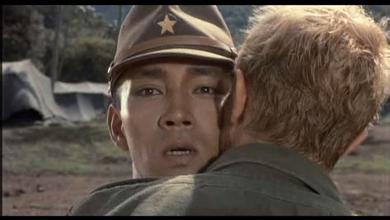Merry Christmas, Mr. Lawrence
 |
|
A scene from Merry Christmas, Mr. Lawrence. [Photo/Agencies] |
Merry Christmas, Mr. Lawrence is a 1983 British-Japanese drama film directed by Nagisa Oshima. The film is based on Sir Laurens van der Post's experiences as a Japanese prisoner of war during World War II as depicted in his works The Seed and the Sower and The Night of the New Moon.
In 1942 British soldier Jack Celliers comes to a Japanese prison camp run by Captain Yonoi and Sergeant Hara. Yonoi later on develops a homoerotic fixation with Celliers and Hara befriends the British Lieutenant Colonel John Lawrence, one of the prisoners of war who speak fluent Japanese.
A transmission radio is discovered in the possession of the prisoners of war by the Japanese and Celliers and Lawrence were forced to take the blame. During Christmas Eve, Sergeant Hara orders for their release. As the men leave, Hara calls out for the first time in English, "Merry Christmas, Lawrence!" Although shocked at Sergeant Hara's release of both Celliers and Lawrence, Yonoi only mildly reprimands him for exceeding authority.
Both Yonoi and Hara are redeployed. Their successor declares that "he is not as sentimental as Captain Yonoi" and immediately has Celliers buried in the ground up to his neck as a punishment and then left to die. Captain Yonoi goes to Celliers when there is no one around and takes a lock of his hair. He pays his respects and leaves, and Celliers dies shortly afterwards.
In 1946, four years later, Lawrence visited Hara, who is imprisoned by the Allied forces. Hara learned to speak English while in captivity and reveals that he was going to be executed the next day for war crimes, stating that he is not afraid to die, but didn't understand how his actions were any different from those of any other soldier. Hara reminisces about that Christmas Eve and both are very much amused. The two bid each other farewell for the last time and just before Lawrence leaves, Hara called out again, "Merry Christmas! Merry Christmas, Mr. Lawrence!"
The film enters into the 1983 Cannes Film Festival in competition for the Palme d'Or. It also won the BAFTA Award for Best Film Music in 1983.